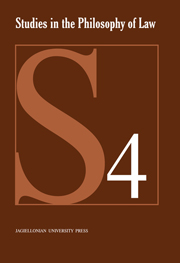Book contents
- Frontmatter
- Contents
- Preface
- Six Causes of the Dispute over Legal Bioethics
- Bioethics and Legal Philosophy
- The Outline of the Subject of Biojurisprudence
- Law and Biotechnology
- The Ethical Significance of Evolution
- Human Nature after Darwin
- The Notion of the Person in Bioethical Debates
- The Roots of Normativity. From Neuroscience to Legal Theory
- Why No One Should Ever Win the Nobel Prize: Neurolaw, Reward and Punishment
- Is There Anybody Who Really Wants to Live Forever? The Significance of Mortality
- The Slippery Slope Arguments Against the Legalization of Physician-Assisted Suicide
- Ethical Problems of Hematopoietic Stem Cells Transplantation
- Notes about the Authors
Law and Biotechnology
Published online by Cambridge University Press: 05 September 2014
- Frontmatter
- Contents
- Preface
- Six Causes of the Dispute over Legal Bioethics
- Bioethics and Legal Philosophy
- The Outline of the Subject of Biojurisprudence
- Law and Biotechnology
- The Ethical Significance of Evolution
- Human Nature after Darwin
- The Notion of the Person in Bioethical Debates
- The Roots of Normativity. From Neuroscience to Legal Theory
- Why No One Should Ever Win the Nobel Prize: Neurolaw, Reward and Punishment
- Is There Anybody Who Really Wants to Live Forever? The Significance of Mortality
- The Slippery Slope Arguments Against the Legalization of Physician-Assisted Suicide
- Ethical Problems of Hematopoietic Stem Cells Transplantation
- Notes about the Authors
Summary
It is accepted that the quality of fact-finding, as well as that of decision-making, in law, and especially in legal processes, is not measured solely by the adequacy or truth of its outcomes. As law is concerned with practical reasonableness, it seeks to identify and prescribe optimal practices which need not necessarily be based on assertions which are considered true or most probable in terms of science. It is so even when practices regulated by law strictly replicate those defined in science, and, as such, this seems to be the case as far as the regulation of biomedical or biotechnological practices is concerned. As legal decision-making is a complex social practice, it must balance truth against other values, such as certain social states of affairs (e.g. tranquillity, peace, efficiency), or values pertaining to an accepted conception of human nature (e.g. individual freedom, human dignity), or values ascribed to law and legal order (e.g. consistency, stability). To put it briefly, there are epistemic and extra-epistemic factors necessarily involved in the process of decision-making in law. However, as M. Damaška rightly notes, it is extremely difficult to tell them apart. This difficulty, if realized at all by decision-makers, be it legislators or adjudicators, may lead to the adoption of different cognitive strategies. If their decisions are to be justified as rational, they must – at least potentially – be subject to scrutiny which involves examining the relations between means and ends.
- Type
- Chapter
- Information
- Studies in the Philosophy of LawLegal Philosophy and the Challenger of Biosciences, pp. 55 - 64Publisher: Jagiellonian University PressPrint publication year: 2010



